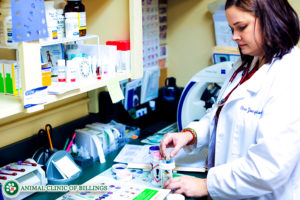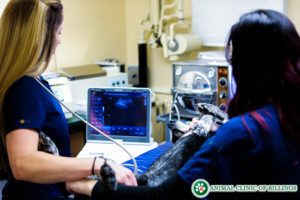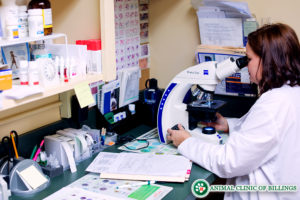Laboratory Tests and Services
THE ANIMAL CLINIC OF BILLINGS IS EQUIPPED WITH A FULL IN-HOUSE LABORATORY

The Animal Clinic of Billings has a state-of-the-art, comprehensive in-house laboratory which provides almost immediate results for emergency cases or critically ill patients.

A blood test can reveal extremely valuable information regarding the health of your dog or cat which can only be discovered by analyzing a blood sample.
With our patients’ well-being in mind, we offer a wide range of diagnostic tests in our in-house laboratory. These include blood work (CBC or complete blood counts, chemistry panels, blood clotting times, blood typing, etc.), urinalysis, skin scrapings, fungal cultures, skin or ear cytologies, and fecal exams to check for intestinal parasites just to name a few.
Blood tests can determine the presence of various viruses, endocrine problems, organ function, vaccine immunity, cell counts and much more. In addition, we can perform various other tests such as feline leukemia/FIV testing, parvovirus, and heartworm tests.

Early detection of diseases can almost always significantly improve the prognosis in treating it for your dog or cat. This is why our veterinarians recommend regular blood and urine tests every six months for all our senior patients over the age of seven years old.
UNDERGOING LAB TESTING ON DOGS AND CATS

Lab testing enables our veterinarians to eliminate non-occurring possible causes for what’s happening because in many cases, a dog or cat will display symptoms that could be the result of several or even many serious conditions. By performing a comprehensive chemistry panel, we can pinpoint the exact cause for your dog or cat’s illness and provide the best treatment possible.

Diagnostic laboratory testing is essential for pets of any kind to ensure they retain long term health and happiness throughout their lives. Additionally, a chemistry panel and complete blood count establishes a baseline for the health of your dog or cat that makes identifying any changes to it tremendously helpful and easy to detect.
Our veterinarians at the Animal Clinic of Billings and Animal Surgery Clinic recommend several laboratory tests are performed annually on all pets and semi-annually in pets over the age of seven years old.
Additionally, we require a blood test is taken before a dental cleaning, removal of skin masses, or any other procedure that requires anesthesia to ensure there are no health concerns present that could jeopardize your dog or cat’s safety during anesthesia. These tests include a heartworm test, parasite screening, and a full blood workup.
In-House Lab Tests For Cats and Dogs
- CBC (Complete Blood Count): This blood panel measures the cellular components of blood, including:
- Red Blood Cells: These are the cells that carry oxygen throughout the body. An abnormally low level of RBCs is called anemia. This can be caused by a wide variety of conditions, including blood loss, immune-mediated diseases, bone marrow disorders, and chronic diseases.
- White Blood Cells: These cells are part of the body’s immune system, and serve to respond to damage and inflammation as well as fight off infections.
- Neutrophils: These WBCs are the first responders to areas of inflammation and infection in the body, where they kill pathogens and send out signals to recruit other WBCs. These can be elevated in the presence of infection, inflammation, or cancer. They can be decreased in any disease that impairs the immune system, or in the presence of a severe infection.
- Eosinophils and Basophils: These WBCs are primarily responsible for responding to parasitic infections. They also play an important role in allergies and asthma. Usually an increase in either of these types suggests the presence of a parasite, an allergy, or asthma.
- Lymphocytes: These WBCs perform a variety of essential functions, including the manufacture of antibodies against pathogens and the destruction of pathogens and infected and abnormal cells. These are the cells that respond to a vaccine to generate immunity. These cells can be elevated in the presence of infection, inflammation, or cancer. They can be decreased in any disease that impairs the immune system, or in the presence of a severe infection.
- Monocytes: These WBCs function as a “cleanup crew” at sites of infection and inflammation, digesting dead cells and debris in addition to pathogens. These cells are elevated in the later stages of an infection, with chronic inflammation, and with some types of cancers.
- Platelets: These cell fragments play an essential role in blood clotting. Decreased levels can result from some infectious diseases, immune-mediated conditions, bone marrow disorders, and as a result of hemorrhage.
- Serum Biochemistry: This blood panel provides a great deal of information about the body’s metabolic processes and organ functions.
- Albumin: The main protein in the blood, albumin is essential to maintain blood pressure and transporting a wide variety of important substances in the blood. Low albumin may result from disease of the liver, kidneys, GI tract, or blood vessels.
- Globulins: In addition to transporting numerous substances throughout the body, this group of blood proteins also plays an important role in the immune response to infections. A decrease in globulins may indicate a problem with the liver, GI tract, or immune system. Globulins can be elevated in response to infections, as well as in some types of cancers.
- Total Protein: The total level of proteins in the blood, the primary components of which are albumin, globulins, and fibrinogen (a protein important for blood clotting).
- Glucose: The level of sugar in the blood. An elevated level is suggestive of diabetes, although stress can also result in temporarily increased levels. Decreased blood glucose can occur from prolonged fasting in toy-breed dogs and puppies, from liver disease, and from severe infections.
- Alkaline Phosphatase (ALP): This enzyme is contained within liver cells, and elevated blood levels may result from damage to the liver and biliary system, from Cushing’s Disease (hyperadrenocorticism), or from steroid administration. It is commonly elevated in young growing animals because it is also produced by growing bones.
- Alanine Aminotransferase (ALT): This enzyme is present in the liver, muscles, and heart. An elevated ALT may result from injury to any of these organs.
- Amylase: This enzyme is produced by the pancreas and breaks down sugars in the intestine. It can be elevated in cases of pancreatic, GI, or kidney disease.
- Lipase: This digestive enzyme is produced primarily by the pancreas. An elevated level may indicate disease of the pancreas, GI tract, or kidneys.
- Cholesterol: An essential component of cells and participant in many processes thoughout the body. An elevated level can be seen with liver, pancreatic, or endocrine disorders. A decreased level may indicate liver, endocrine, metabolic, or nutritional disorders.
- Gamma-Glutamyl Transferase (GGT): A protein present in cells in the liver, biliary system, and pancreas. Increased levels can be seen with disorders of any of these organs.
- Total Bilirubin: Bilirubin is a product of the breakdown of old red blood cells, and is eliminated in bile and urine. An elevated blood level can cause icterus (jaundice)—a yellow tint to the skin and whites of the eyes. Elevation can be the result of increased red blood cell destruction (usually immune-mediated), liver disease, or blockage of the biliary system.
- Blood Urea Nitrogen (BUN): A waste product of protein breakdown by the liver, this metabolite is eliminated by the kidneys. An elevated level may result from dehydration, a high protein diet, kidney disease, or disorders of the urinary tract. BUN can be decreased in cases of decreased protein intake and liver disease.
- Creatinine: A waste product of muscle metabolism, creatinine is eliminated by the kidneys. An elevated level may result from dehydration, kidney disease, or urinary tract disease. A decreased level can be seen in patients with decreased muscle mass.
- Calcium: This mineral is essential for numerous processes in the body. Elevated levels occur in cases of hyperparathyroidism, hypoparathyroidism (Addison’s Disease), kidney disease, vitamin D overdoses, and some cancers. Decreased levels occur with kidney disease, hypoparathyroidism, and in some nursing females.
- Phosphorus: Another crucial mineral in the body. Abnormal levels usually indicate a problem with the kidneys or parathyroid glands.
- Serum Electrolytes: This blood panel measures the circulating level of several important electrolytes.
- Sodium (Na): Sodium is a tightly-regulated electrolyte essential in the regulation of blood volume and blood pressure, as well as in numerous cellular processes. Sodium can be elevated with dehydration, endocrine disorders, and excessive intake. Decreased levels can result from endocrine diseases, heart failure, liver disease, kidney disease, and excessive water intake.
- Potassium (K): Another electrolyte that serves many important roles in the body. It can be elevated in cases of endocrine disorders and kidney and urinary diseases. A decreased level usually indicates an endocrine or GI disorder, or inadequate intake.
- Chloride (Cl): This electrolyte can be elevated in the presence of kidney or GI disease, and can be decreased in GI disease or when excess sodium is lost from the body.
- Symmetric Dimethylarginine Assay: This blood test measures SDMA, a molecule that is produced by the body at a relatively constant rate, and is eliminated by the kidneys. This is currently the earliest marker of kidney disease for animals, enabling detection of as little as 25% loss of function.
- Total Thyroxine Level: This blood test measures thyroid activity. Hypothyroidism is a relatively common disorder in dogs, causing decreased energy, weight gain, and a thinning coat. Hyperthyroidism develops frequently in older cats, causing weight loss despite a good appetite, and putting strain on the heart. Both of these conditions are treatable once diagnosed.
- Canine Pancreatic Lipase Test: An elevated level of pancreatic lipase is most commonly seen with pancreatitis, but may also indicate other diseases of the pancreas.
- Heartworm Test: This test detects the presence of heartworms in dogs. Heartworms are a parasite transmitted by mosquitos that cause severe damage to the heart and lungs. All dogs, even those on a preventative year-round, should be tested annually so that if an infection is present, it can be treated before it causes irreversible damage.
- FeLV and FIV Test: This combination test detects the presence of Feline Leukemia Virus and Feline Immunodeficiency Virus in cats. Feline Leukemia Virus is transmitted via direct contact with an infected cat. This life-threatening virus impairs immune function, resulting in increased vulnerability to infections, and in many cases also causes lymphoma, a cancer of immune system cells. Feline Immunodeficiency Virus is most commonly spread through bite wounds. Most infected individuals will eventually develop significant dysfunction of the immune system, rendering them unable to fight off infections. While neither of these conditions are curable, with special precautions, close monitoring, and supportive care for infections, lifespan and quality of life can be maximized.
- Parvo Test: This stool test quickly identifies the presence of parvovirus in sick puppies and adult dogs, enabling the rapid institution of intensive medical therapy for this life-threatening disease.
- Urinalysis: This panel of urine tests provides a great deal of information about the kidneys, urinary tract, and metabolic status of a patient
- Urine Specific Gravity: This is a measure of urine concentration. Inappropriately low concentration with respect to a patient’s level of hydration can indicate the presence of kidney dysfunction, diabetes, endocrine disorders, liver disease, or elevated calcium levels in the blood.
- Urine pH: This is a measure of how acidic or basic a urine sample is. Urine pH is influenced by diet, medications, urinary tract infections, and a number of other conditions. pH impacts the ease with which particular types of crystals and stones form in the urine.
- Leukocytes (White Blood Cells): An increased level of white blood cells in the urine indicates the presence of inflammation or an infection.
- Protein: The presence of protein in the urine can result from a fever, strenuous exercise, seizures, heat stroke, kidney disease, or urinary tract disease.
- Glucose: The presence of glucose in urine is most commonly associated with diabetes, but may also be seen with stress, steroid administration, or kidney disease.
- Ketones: These are a product of the metabolism of fatty acids by the liver, and may indicate diabetes, a very low carbohydrate diet, or prolonged fasting.
- Urobilinogen: This is a byproduct of the breakdown of red blood cells; it can be elevated in the presence of accelerated red blood cell breakdown and liver disease.
- Bilirubin: This is also a byproduct of red blood cell breakdown; elevation suggests an increased rate of red blood cell destruction or liver disease.
- Blood/hemoglobin: The presence of red blood cells or hemoglobin (a component of red blood cells) may result from kidney or urinary tract disease, or from the breakdown of red blood cells within the bloodstream. If a urine sample is collected directly from the bladder using a needle and syringe (cystocentesis), a tiny amount of blood may be introduced to the sample, causing a positive reading.
- Urine Sediment: A portion of the urine sample is spun in a centrifuge to concentrate any solids, which are then examined under a microscope. Red blood cells, white blood cells, epithelial cells (cells lining the bladder and urethra), casts (aggregates of cells and debris from a damaged kidney), bacteria, and crystals can all be identified and quantified.
 We routinely work with a large veterinary diagnostic lab to perform additional tests, including:
We routinely work with a large veterinary diagnostic lab to perform additional tests, including:
- Testing for endocrine diseases, such as Cushing’s Disease (hyperadrenocorticism), Addison’s Disease (hypoadrenocorticism), thyroid disease, and parathyroid disease
- Testing for GI and pancreatic diseases
- Liver function testing
- Infectious disease testing
- Therapeutic drug monitoring
- Vaccine Titers
- Bacterial culture and antibiotic susceptibility testing
- Cytology of fluid and tissue aspirates

Let our highly trained and experienced team of veterinarians and veterinary technicians help you keep your pet as happy and healthy as they can be.
Call the Animal Clinic of Billings to schedule your pets next wellness examination with us today!
406-252-9499 REQUEST AN APPOINTMENT



